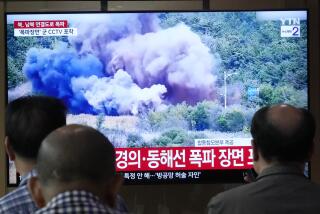Koreas Each Seek Apology
TOKYO — South Korea demanded an apology from North Korea and punishment for those responsible Saturday after a deadly skirmish in the Yellow Sea killed four of its sailors and injured nearly two dozen others.
The North, however, quickly said that it was the one owed an apology, charging that vessels from the South had trespassed in the sea off the peninsula’s western coast and fired first.
For the record:
12:00 a.m. July 10, 2002 For The Record
Los Angeles Times Wednesday July 10, 2002 Home Edition Main News Part A Page 2 National Desk 10 inches; 382 words Type of Material: Correction
Warship--A June 30 story about a naval clash between North and South Korea incorrectly identified one vessel as a battleship. It was a corvette.
*
Their warships “intruded deep into our territorial waters,” the North said on the state-run Korean Central News Agency. “The incident was a premeditated military provocation on the part of the South Korean military from A to Z.”
Regional political and military specialists, meanwhile, were poring over emerging details in hopes of gaining some insight into what happened, why, and how high up the North Korean leadership chain any decision might have been made.
According to the South Korean military, two North Korean naval ships were sailing with a fleet of fishing vessels Saturday morning north of the so-called Northern Limit Line, or sea border.
At 9:54 and 10:01 a.m., by this account, the North’s two ships crossed into South Korean territory, 25 miles west of the island of Yonpyong, while leaving the fishing fleet behind. Four South Korean patrol boats caught up with them roughly 25 minutes later to issue a warning and steer them back across the border.
Craft from North Korea have made several incursions recently along the sea border, which is not officially recognized by the government in Pyongyang. The Communist nation has dire food shortages, and fish and crab are plentiful in the area this time of year. The South Korean crew reportedly assumed that Saturday’s contact would follow the usual pattern, with the North’s ships turning around after being warned.
But as one of the South Korean vessels came within 500 yards of the westernmost North Korean ship, the South said, it was fired upon.
In the hail of shells, a lieutenant and three enlisted men on the South’s patrol boat were killed, and at least 18 sailors were listed as injured, with one missing. The shelling also set the engine room on fire.
As soon as the other South Korean patrol boats realized what had happened, they opened fire. This inflicted heavy damage on the North Korean ship, which began to burn as well. The North has not disclosed how many injuries or casualties it suffered; the ships each can carry up to 50 people. Each side then called for backup help to tow its damaged vessel out of the area to safety.
The North Korean ships retreated across the border at 10:50 a.m. But the South Korean boat sank as it was being towed back to base, delaying any investigation into what weaponry was used against it and how many shells were fired.
The South Korean military said that a squadron of fighter jets was then brought in to patrol the sea border along with a 1,200-ton battleship.
If, as military analysts believe, the South’s vessel suffered a direct hit by one or more 85-millimeter shells from about a quarter of a mile away, it’s not surprising that it was badly damaged. Those weapons have a range of nine miles.
In Washington on Saturday, the State Department expressed condolences to the relatives of the slain naval personnel and said it stood behind the South Korean government.
“We support the stance of our allies against armed provocation,” said Brenda Greenberg, a State Department spokeswoman. “We regret the loss of life and injuries, and we want to express our sympathy to the families.”
Greenberg added that officials from the U.S. Embassy in Seoul and the United States forces in South Korea had been in close contact with South Korean authorities about the incident.
The reports that the North Korean ships crossed the border into the South’s crab-rich waters alone, without any fishing vessels, and opened fire after receiving a warning over loudspeakers led many experts to conclude that the incident was premeditated.
“The circumstantial evidence suggests it’s intentional,” said Masao Okonogi, a North Korea expert at Keio University in Tokyo. “There are many cross-border incidents, but usually they turn around after being warned.”
Even if the exchange of fire was set off by the spontaneous response of a panicked crew, the clash could have far-reaching effects. On Thursday at the United Nations, a U.S. State Department official had proposed to North Korean diplomats that a senior U.S. official visit Pyongyang in the second week of July to restart stalled talks. Now, those will probably be delayed or perhaps put off indefinitely, analysts said.
“It’s hard to lower Washington’s opinion of North Korea,” said Ralph A. Cossa, executive director of the Honolulu-based Pacific Forum Center for Strategic and International Studies. “But this will certainly feed those folks who are against any kind of engagement.”
In the South Korean political sphere, the skirmish will almost certainly help the opposition Grand National Party in a presidential election year and hurt the government, which has favored reconciliation with its mercurial northern neighbor under the so-called sunshine policy.
“The opposition will immediately exploit this and charge that the government’s sunshine policy has failed,” said Paik Hak Soon, a North Korea specialist with the government-funded Sejong Institute.
Indeed, the GNP said in a statement Saturday that the confrontation “throws cold water over warming ties.”
For South Korean President Kim Dae Jung, who is mired in scandal and has just six months left in office, the deadliest North-South confrontation in three years could further tarnish his legacy and his Nobel Peace Prize-winning policy of accommodation. It could also strain his relations with Washington should he attempt to defend the North’s actions.
Observers who assumed that the shooting was intentional offered several theories Saturday for its rationale and timing. Some, like Okonogi, believe that the dictatorship in the North is extremely jealous of the prestige and global attention South Korea has received in recent weeks from co-sponsoring the World Cup soccer championship tournament and wanted to interject a disruptive note. This does not seem to jibe, though, with Pyongyang’s decision last Sunday to broadcast on state television South Korea’s victory over Italy five days earlier, accompanied by a generally supportive narrative.
Another possible explanation is that the North Korean military wanted to flex some muscle before the government enters any talks with the United States. But if that were the case, it ran the risk of cutting off all communication with already distrustful conservative governments in Washington and Tokyo. And the result could help elect a similarly minded conservative administration in Seoul before year’s end.
Finally, some, like Korea University assistant professor Yoo Ho Yeol, saw the incident as evidence of infighting in the North.
“I think North Korea intended to shoot this time. The question is who decided,” he said.
Hard-liners in the North Korean military staged the confrontation, Yoo speculated, hoping to derail U.S.-North Korean talks. They fear that their power could be undermined if Pyongyang makes concessions to the U.S., he said.
*
Times staff writer Elizabeth Shogren in Washington contributed to this report.
More to Read
Sign up for Essential California
The most important California stories and recommendations in your inbox every morning.
You may occasionally receive promotional content from the Los Angeles Times.










